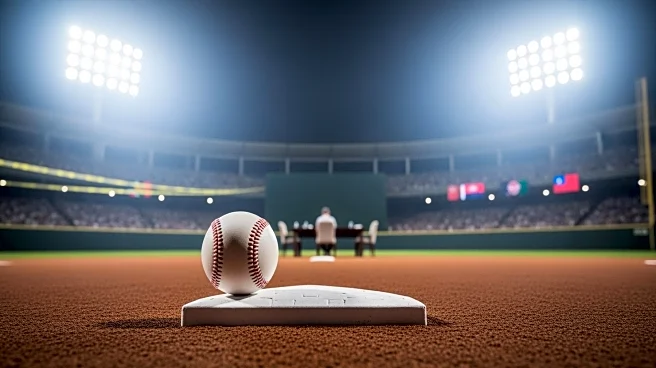What's Happening?
Yamamoto Yoshinobu, a pitcher for the Los Angeles Dodgers, delivered an exceptional performance in Game 2 of the 2025 MLB World Series against the Toronto Blue Jays. The game, held at Rogers Centre in Toronto, saw Yamamoto allowing only four hits, striking
out eight, and conceding one run over nine innings, leading the Dodgers to a 5-1 victory. This win tied the series at 1-1. Yamamoto's feat of pitching two consecutive complete games in the postseason is a rare achievement, last accomplished by Kurt Schilling in 2001. His performance has drawn praise from Clayton Kershaw, a legendary MLB pitcher, who described Yamamoto's pitching as 'amazing' and 'against the times,' highlighting the changing role of starting pitchers in MLB.
Why It's Important?
Yamamoto's performance is significant as it challenges the current trend in MLB where starting pitchers are often replaced early in games. His ability to pitch complete games reduces the burden on the bullpen and allows for better management of the batting lineup. This could influence teams to reconsider their pitching strategies, potentially leading to a shift back towards valuing complete games. For the Dodgers, having a pitcher like Yamamoto provides a strategic advantage, as it allows them to maintain a strong starting rotation and manage games more effectively. This could impact their chances in the World Series and set a precedent for other teams.
What's Next?
As the World Series progresses, the Dodgers will likely continue to rely on Yamamoto's pitching prowess to gain an edge over the Blue Jays. His performance may prompt other teams to evaluate their pitching strategies and consider the benefits of allowing pitchers to complete games. The Dodgers' management might also explore ways to further support Yamamoto and their starting rotation, ensuring they capitalize on this advantage. Fans and analysts will be watching closely to see if Yamamoto can maintain his exceptional form and lead the Dodgers to a World Series victory.
Beyond the Headlines
Yamamoto's success could inspire young pitchers to focus on endurance and complete game pitching, potentially leading to a cultural shift in how pitchers are trained and utilized in MLB. This development might also spark discussions on the balance between traditional pitching roles and modern strategies, influencing future MLB policies and team dynamics.















